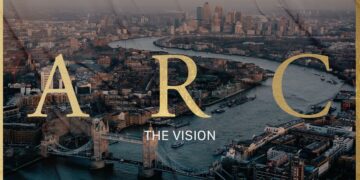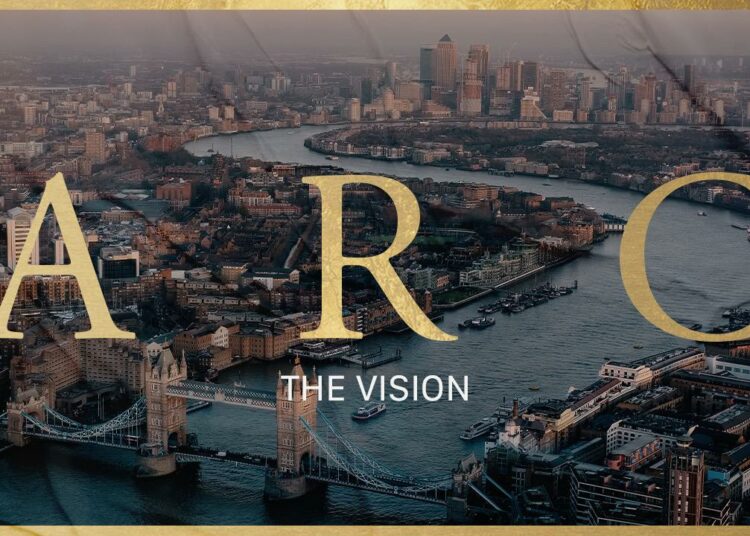IFamNews delegates were privileged to attend the inaugural conference of the Alliance for Responsible Citizenship (ARC) held in London last week. ARC CEO Baroness Philippa Stroud and Board member Dr. Jordan Peterson delivered the opening speeches to a packed conference room of London’s Magazine Centre, noting that the ARC is an attempt to find a way to solve the “fragmentation, division, polarization and intolerance” in society and set out their vision for a better future.
Opening the conference, Baroness Stroud said: “We’re going to debate what needs to be renewed, and identify a path forward full of strength, hope and vision… to build a community filled with people of courage and strength, that sees the opportunity of abundance, not scarcity and decline”.
World-renowned psychologist, author and media commentator Dr. Jordan Peterson delivered an inspiring speech in which he outlined his vision of distributive responsibility, saying that “ARC is our movement into the future… We have the responsibility to face an uncertain future with faith and courage.” He also called on international leaders to “define reality and set out the choices that people must make.”
More than 1,500 delegates in attendance, having arrived from 71 countries all over the world, were delivered momentous and inspiring speeches by distinguished figures from public and political life, and academia, including the current and former US House Speakers, Kevin McCarthy and Mike Johnson, former Australian Deputy Prime Minister John Anderson, historian Os Guinness, UK Government Minister Michael Gove, Dr. Bjorn Lomborg, Dr. Scott Tinker, British MP Kemi Badenoch, and Dennis Prager to name a few.
McCarthy echoed President Ronald Reagan’s 1982 speech to the UK Parliament: “The ultimate deterrent in the struggle that now is going on in the world will not be bombs or rockets, but a test of wills. The values we hold, the beliefs we cherish, the ideals to which we are dedicated.”
Panelists in the first session called for a return to traditional values of equality of opportunity and faith following a period of directionlessness. “The West is in considerable confusion and uncertainty,” Guinness warned. “People don’t have a sense of meaning as they don’t feel part of a great story or tradition”, he said, following up on Baroness Stroud who in the opening speech said that ARC has gathered to discuss how to combat the negativity in the world and to “tell a better story”.
British MP Miriam Cates said that “freedom, prosperity, and happiness are not values…they may be the fruits of a successful society, but they are not its roots” and that “the true roots of Western civilization are the pursuit of the good, the true, and the beautiful”.
Professor Jonathan Haidt, psychologist and author, argued for urgent action to address the rise in children’s mental health issues as a result of social media. “The Great Rewiring of Childhood happened between 2010 and 2015,” he told the conference. “But you can’t grow up in networks, you have to grow up in communities… Nobody defends this phone-based childhood. Everyone sees the problems.”
Professor Haidt went on to propose a set of norms to curb the negative effects of social media on children including restrictions on smartphones for children before high school, a ban on social media for those under-16, and for the global expansion of phone-free schools.
He also warned of the dangers arising from social media for Western society: “TikTok and Twitter are dangerous for our democracy, and incompatible with the kind of liberal democracy we have developed over the last 150 years.”
In the afternoon session, investor Sir Paul Marshall criticized “crony capitalism” and “corporatism” and called for society to “rejoice in the abundance that true free enterprise and free markets create”, noting that “extreme poverty has fallen from 90% to 10% [and] … it has halved in the last twenty years alone”. He stated that “free market capitalism is the greatest instrument of poverty relief that the world has ever seen”.
US presidential candidate Vivek Ramaswamy joined the event via video call and criticized the corporate adoption of ESG values as “a threat not just to capitalism, but also to democratic self-governance… that a small group of corporate actors have the right to decide through the back door what citizens could not do through the front door.”
Day two featured, inter alia, a panel with Dr. Peterson, Louise Perry, Mary Harrington, and Professor Stephen Blackwood on the consequences of freedom without responsibility for our social fabric. Journalist and author of “The Case Against the Sexual Revolution”, Louise Perry said that “Traditions are experiments that worked. What we have found, having rejected the sexual norms of the past, is that they were there for a reason… The winners of the sexual revolution have not been women…and the great losers of the sexual revolution are children”.
Speaking about issues very close to the mission of IOF – children, motherhood, families – also on the second day of the conference Dr. Erica Komisar, psychoanalyst and parental expert, said, “Our children are under the worst academic pressure that we have ever heard in history”, warning the audience of a mental health epidemic in children arising from an absence in parental presence due to contemporary labor market pressures and childcare costs.
She urged for a series of reforms to government childcare policies as a necessary step in alleviating the mental health crisis around the world, adding that “Governments need to give all mothers the option to stay home for a full year, and support them with resources so they can work part-time for another two years”. Komisar also called for school to start later for teenagers, tax incentives for married parents, and a tax credit system incentivizing parents to invest in mental health care.
The author of two books on parenting, Komisar also called on the private sector to enable new parents to spend more time with their new children: “employers have a role to play in allowing parents the space and time to be present for their children, providing options of flexible hours and hybrid working hours, encouraging career pauses to parents raising their children…as well as providing re-entry points for women.”
One of the many distinguished speakers on day 3 of the conference was former Australian Prime Minister John Howard who said that “multiculturalism is a concept that I’ve always had trouble with. I take the view that if people want to emigrate to a country, then they adopt the values and practices of that country.”
“We try too hard to institutionalize differences, rather than celebrate what we have,” Howard continued.
His comments came following Australia’s Voice referendum last month, which delivered what Howard described as “a stonking endorsement of how united we are. We don’t want separation based on race or background, we want unity.”
Shadow Minister for Indigenous Australians Jacinta Nampijinpa Price also spoke about the Voice referendum, noting that it “sought to divide us along the lines of race”, but ended up being “a turning point in our nation” that has “emboldened everyday Australians to believe that it is perfectly OK to be who you are.”
Another topic close to our heart here at IFamNews was covered by educationalist Katharine Birbalsingh, headmistress of the Michaela Community School, a free school established in 2014 in London, who spoke about the importance of education to societal harmony, saying that “if we want multiculturalism to succeed and tribalism to fail, we must stop ignoring the enormous, crucial power of our schools.”
She warned that “the more diverse a school or society, the more difficult it is to make it work… Multiculturalism will fail in our country without small-c conservatism and rules in our schools.”
Birbalsingh called for attitudes of “allegiance to nationhood” to be reinstated, saying that “if schools promote BLM, LGBT and various other tribal identities instead of installing an overarching set of small-c conservative values, they encourage children to identify as victims instead of empowering them.”
The IFamNews team is grateful to have attended such a momentous event in the presence of so many brave and distinguished persons employing their talents and knowledge to try and save the Western civilization from the throes of totalitarian ideologies.
Many more memorable speeches were delivered, and can be viewed at ARC’s YouTube channel. It was truly inspiring and much needed to hear words of encouragement from people on the frontlines of the culture wars of our time. To us, activists, and to all our readers – parents, grandparents, young people, teachers, caregivers, doctors and other professionals, workers, farmers and artisans – the key message is that each of us can do something good for our families and our society, each of us can make a contribution and an impact. It is the duty of each of us to be responsible citizens and caring neighbors, giving our two cents in many different ways to make a better world and be part of “the better story”.




















Discussion about this post